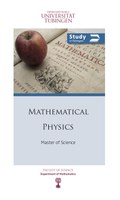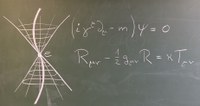Master in Mathematical Physics
 Since October 2017, the Mathematics Department and the Physics Department at the University of Tübingen jointly offer an interdisciplinary international two-year master's program in Mathematical Physics.
Since October 2017, the Mathematics Department and the Physics Department at the University of Tübingen jointly offer an interdisciplinary international two-year master's program in Mathematical Physics.
Benefits of studying Mathematical Physics in Tübingen
- Top-level research activity at a German excellence university
- Flexible study program that allows to combine mathematics and physics courses
- Close contact to fellow students and faculty due to small size and selectivity
- Tübingen is a livable and internationally-minded university town with high-tech industry and beautiful surroundings
The deadline for applicants from within the EU is September 15 of the same year. To allow for sufficient time for administrative preparations (e.g. visa)., the deadline for applicants from outside the European Union is July 15 of the same year.
Study Concept
The master's program Mathematical Physics is a research oriented interdisciplinary program geared towards fundamental research at the interface of mathematics and physics.
The development of modern Mathematics and of modern Physics are strongly interwoven. On the one hand, our modern picture of the physical world is formulated in terms of advanced mathematical theories and models. On the other hand, many developments in modern Mathematics were motivated from or even anticipated within Physics.
 In the Tübingen master's program in Mathematical Physics, students will learn advanced mathematical concepts and fundamental physical theories in a specific interdisciplinary study program.
In the Tübingen master's program in Mathematical Physics, students will learn advanced mathematical concepts and fundamental physical theories in a specific interdisciplinary study program.
In contrast to several other programs in Mathematical Physics, the Tübingen program has its focus on established physical theories with important applications in science and technology. The main areas are Quantum Theory, General Relativity, and Statistical Physics, reflecting the main research areas present in Tübingen's Mathematics and Physics Departments. So if you are interested in understanding our most successful physical theories on the most fundamental level, this master program is tailor made for you.
 Apart from the mandatory core modules Geometry in Physics, Mathematical Quantum Theory, Mathematical Relativity, and Mathematical Statistical Physics, students can choose from a wide variety of advanced courses in Mathematics, Theoretical Physics, and Mathematical Physics. Thereby they can specialize according to their personal preferences in certain areas of Mathematics and/or Physics. During the second year, we offer a Mathematical Physics Colloquium where students learn about recent developments in Mathematical Physics and also present the results of their own master thesis research.
Apart from the mandatory core modules Geometry in Physics, Mathematical Quantum Theory, Mathematical Relativity, and Mathematical Statistical Physics, students can choose from a wide variety of advanced courses in Mathematics, Theoretical Physics, and Mathematical Physics. Thereby they can specialize according to their personal preferences in certain areas of Mathematics and/or Physics. During the second year, we offer a Mathematical Physics Colloquium where students learn about recent developments in Mathematical Physics and also present the results of their own master thesis research.
Our master program is focused on mathematical aspects of physics. We value a broad education of our students that covers the fundamentals and also connects them to modern topics, for example, quantum information science. Another example of the broad outlook of our students is the following quantum animations project which was done by two of our students. They beautifully animated several quantum phenomena to complement the more mathematical perspective that we take in our core course Mathematical Quantum Theory.
Details on the program structure
People and Institutions involved in the master's program
Mentoring
Every student will be assigned a mentor from the group of professors involved in the master program. In particular, the choice of modules for each semester must be discussed with and approved by the mentor. This ensures that students choose matching modules in line with their desired specialization.
Requirements/Application
The study program requires enthusiasm, curiosity, and a solid background in mathematics and/or physics and acquaintance with the other field. We expect broad interest in Mathematical Physics as well as the willingness to familiarize and work with complex scientific details, and to be able to scientifically communicate in English in written and oral form. Courses are taught in English.
Applicants must have completed a Bachelor of Science degree in Mathematics or Physics (or a comparable undergraduate degree) with a German grade of 2.5 or better (or international equivalent). Students who do not have a German "Abitur" and are not from an English-speaking country need to supply proof of English language proficiency at completed level B2 of the European Framework of Reference for Languages.
- TOEFL (IBT) with a minimum score of 79 or an equivalent test as determined by TS/TOEFL with an equivalent score;
- IELTS with at least level 6.5;
- Cambridge Certificate FCE, CAE, CPE with completed level B2 (Grade A or B) or higher;
- a recognized university entrance qualification obtained in English and in a country whose first official language is English or obtained in a sovereign capacity of one of these countries;
- a recognized university degree of at least three years' duration, taken entirely in English; or
- a German HZB with English as a subject of instruction from at least grade 8 up to the final grade with the final grade "good".
You can start your online application here.
A complete application will include a short CV/resume, copies of your degree certificate, a transcript of records/diploma supplement and a language certificate, as well as a letter of motivation in English detailing why you want to study Mathematical Physics in Tübingen. Please also provide a letter of recommendation by one of your university professors. You can include the letter of recommendation with your application. If your letter writer prefers, they are welcome to send the letter to us directly by email. In this case, please email the letter to mmp[at]math.uni-tuebingen.de with the subject line “M.Sc. letter of recommendation for [applicant name]”. Documentation of prizes/scholarships, or special non-academic activities is welcome.
There is also a FAQ page that might help you with some of you open questions. If you have further questions, please feel free to contact us via email.
Tübingen is a beautiful but small city, so finding accommodation can be difficult. If you are interested in low-price housing in one of the halls of residence for students, we recommend to apply as early as possible, even before getting your official letter of acceptance.
Funding Situation
For students from EU-countries, there is only a small administrative fee of approx. 150€ per semester which also entitles for a discount at the cafeterias and for a discount on the flat rate local transportation ticket. For students from non-EU-countries, the local government recently decided to charge a tuition fee of 1.500 Euros per semester. More precisely this concerns students that do not have either a EU citizenship, or a citizenship of a country of the European Economic Area (EEA), or obtained their high-school degree in Germany. There are a number of further exceptions for people with a permanent residence permit in the EU, for refugees and other people with existing ties to Germany or the EU. But if you plan to come to Europe for the first time in order to study in Tübingen, you will most likely have to pay the tuition fee.
Once accepted into the master's program, it is possible for all students to apply for a job as a teaching assistant in the Mathematics and the Physics Departments, a job which is paid by the hour. However, not all applicants can be guaranteed a teaching assistant position throughout their time in Tübingen, depending on the need of the departments and on the number of applicants.
While the University of Tübingen does not offer financial support towards living costs, there are public and private international and German organizations where international students wishing to study in Germany can apply for fellowships. The major such organization is the German Academic Exchange Service (DAAD). The standard DAAD Master studies grant funds up to 24 months of study. The application deadline is approximately one year before the start of Master studies. In addition to this, the DAAD also maintains a fellowship search database where you can search for fellowships for certain countries of origin and fellowships from other organizations.
Information on living costs for students in Germany and further information on studying in Germany can be found on the website of the German Academic Exchange Service (DAAD).
Students from Vietnam are eligible for a special scholarship from the TL foundation. If you are an applicant from Vietnam and would like your application to be considered for the scholarship, please indicate this in your cover letter. If your application for the program is successful, it will then be automatically forwarded to the TL foundation who will perform an independent selection process for the scholarship.
Career Prospects
This master's program is designed to prepare students for a research career in academia or industry by introducing advanced ideas and techniques in the area of mathematical modeling and analysis that are applicable not only within physics but to a wide range of research areas and sectors in academia, industry, education, and finance.
a) Professional Qualifications
Mathematical physicists with a graduate degree have a strong reputation for general versatility and problem-solving skills that make them highly sought after for high-level positions even in fields such as finance, software or management consulting. In industry, graduates in Mathematical Physics are sought after in all technology driven fields where professionals with advanced skills in mathematical modeling are a scarce resource.
b) Academic Qualifications
Depending on the course selection, the master's program qualifies for doctoral studies in Mathematics and/or Physics. In particular, for some graduates, there will be the possibility to undertake doctoral research in one of the two contributing departments of Mathematics and Physics with various forms of financial support.
Successful participants of this program have gone on to Ph.D.'s at the University of Tübingen and numerous other research institutions in Europe (including UK) and the United States.
The City and the University of Tübingen
 Tübingen doesn’t have a university, Tübingen is a university: young, international, creative, open, innovative. With a total population of about 87.000 people and about 28.000 enrolled students, Tübingen offers a distinguished and traditional academic flair paired with the amenities of the youngest average population among all German cities. The beautiful, historic old town and its picturesque location on the Neckar River offer a high quality of life whether you are studying, working, or taking a break.
Tübingen doesn’t have a university, Tübingen is a university: young, international, creative, open, innovative. With a total population of about 87.000 people and about 28.000 enrolled students, Tübingen offers a distinguished and traditional academic flair paired with the amenities of the youngest average population among all German cities. The beautiful, historic old town and its picturesque location on the Neckar River offer a high quality of life whether you are studying, working, or taking a break.
Innovative. Interdisciplinary. International. Since 1477. These have been the University of Tübingen’s guiding principles in research and teaching ever since it was founded. With this long tradition, the University of Tübingen is one of the most respected universities in Germany. Recently, its institutional strategy was successfully selected for funding in the Excellence Initiative sponsored by the German federal and state governments, making Tübingen one of Germany’s eleven universities distinguished with that title of excellence. Tübingen has also proven its status as a leading research university in many national and international competitions – in key rankings Tübingen is listed among the best universities for the Humanities and Social Sciences as well as for Science and Medicine.
With its broad spectrum of subjects, the University of Tübingen provides a wealth of opportunities for interdisciplinary collaboration. And such close cooperation on research extends beyond the University and around the world. The University of Tübingen has joint research projects at all levels with other institutions of higher education, with research institutes and with industry.
The University’s excellence in research offers optimal study conditions to students who come to Tübingen, combined with the opportunity to emphasize individual interests along the way. The attractive study environment is reinforced by many additional services, such as the Language Centre, interdisciplinary lectures in the Studium Generale and the state-of-the-art University Library. The University motto speaks for itself: attempto – I dare!
